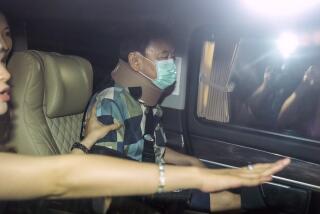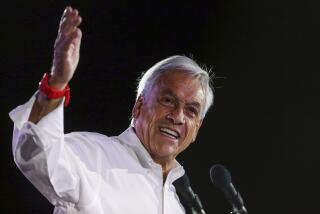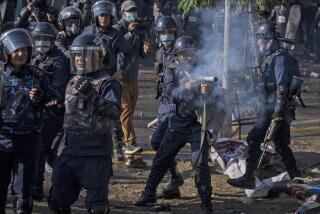Girija Prasad Koirala dies at 86; former Nepalese prime minister
Girija Prasad Koirala, Nepal’s former prime minister who led mass protests that ended the king’s authoritarian rule and helped deliver a peace deal to end 10 years of communist revolt, died Saturday in Katmandu, Nepal. He was 86.
Koirala, who served five terms as prime minister, died at the home of his daughter, Deputy Prime Minister Sujata Koirala. He had been taken there earlier in the week after spending several days in the hospital. He had heart problems and had been hospitalized several times in the last few months.
“His contributions and fight for democracy will always be remembered in history,” Prime Minister Madhav Kumar Nepal said. “He was the pillar in the battle against autocracy in Nepal.”
Koirala was president of the Nepali Congress party and led the mass street demonstrations in 2006 that forced then-King Gyanendra to give up his authoritarian rule, reinstate parliament and appoint Koirala as caretaker prime minister.
Gyanendra was dethroned and the centuries-old monarchy abolished in May 2008. “We have entered a new era today,” Koirala said at the time. The next month, Koirala resigned to allow a new coalition government led by former communist rebels to take power.
Koirala was a key figure in the peace process that ended 10 years of communist insurgency with the Maoist rebels giving up their armed revolt and joining mainstream politics.
A representative for U.N. Secretary-General Ban Ki-moon called Koirala’s death “a huge loss for Nepal and its ongoing peace process.”
Maoist chief Pushpa Kamal Dahal said Koirala’s death weakened the prospects of moving forward with national reconciliation.
“His death has caused irreparable loss to the peace process and process of writing a new constitution,” Dahal said.
Sujata Koirala said her father was worried about the country in the last days of his life and tried to work out an agreement between the political parties.
Thousands of former rebel fighters are still in U.N.-monitored camps. The Maoists want them to be integrated into the national army, but other parties oppose the idea.
The new constitution is supposed to be completed by May, but the parties are struggling to agree on the contents.
Koirala spent seven years in prison in the 1960s for fighting for democratic rule.
After democracy was introduced in 1990, he became one of the most powerful forces in the country’s tumultuous political scene.
In 1991, Koirala became prime minister of the first democratically elected government after a popular revolt ended absolute rule by the king.
His fourth term ended in 2001 with his government beset by the Maoist insurgency, a bribery scandal and recriminations over a palace massacre that wiped out much of the royal family.
His government wasn’t implicated in the killings -- in which the king, queen and seven other royal family members died, apparently at the hands of the crown prince, who killed himself -- but Koirala was blamed for security lapses.
More to Read
Start your day right
Sign up for Essential California for the L.A. Times biggest news, features and recommendations in your inbox six days a week.
You may occasionally receive promotional content from the Los Angeles Times.






